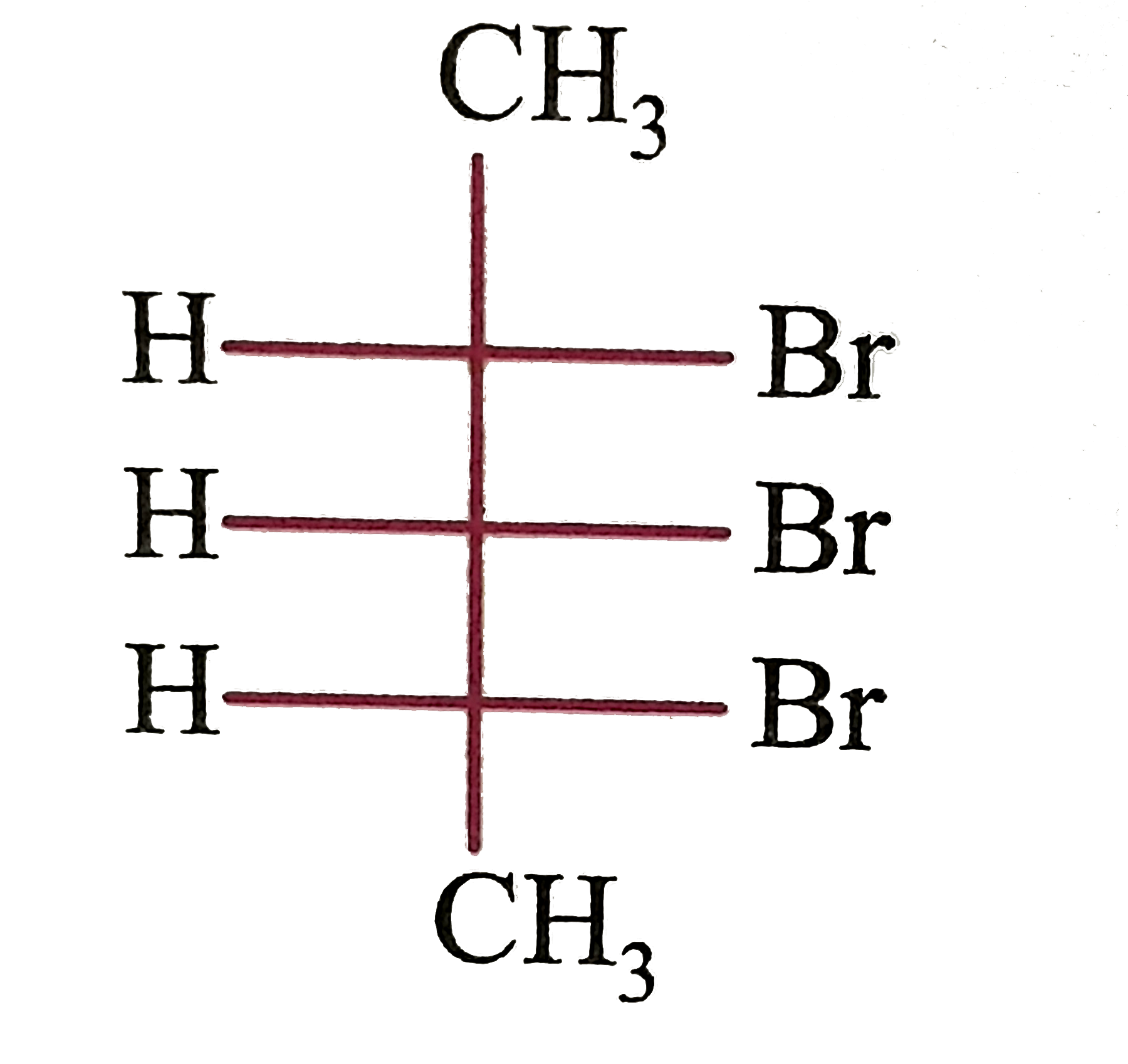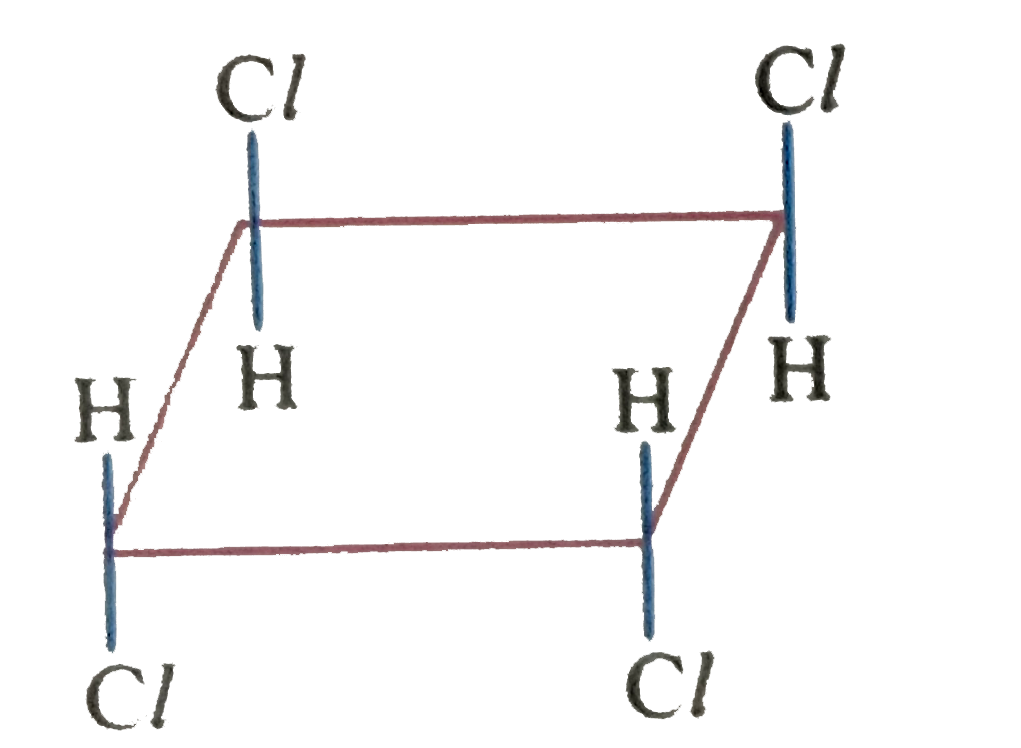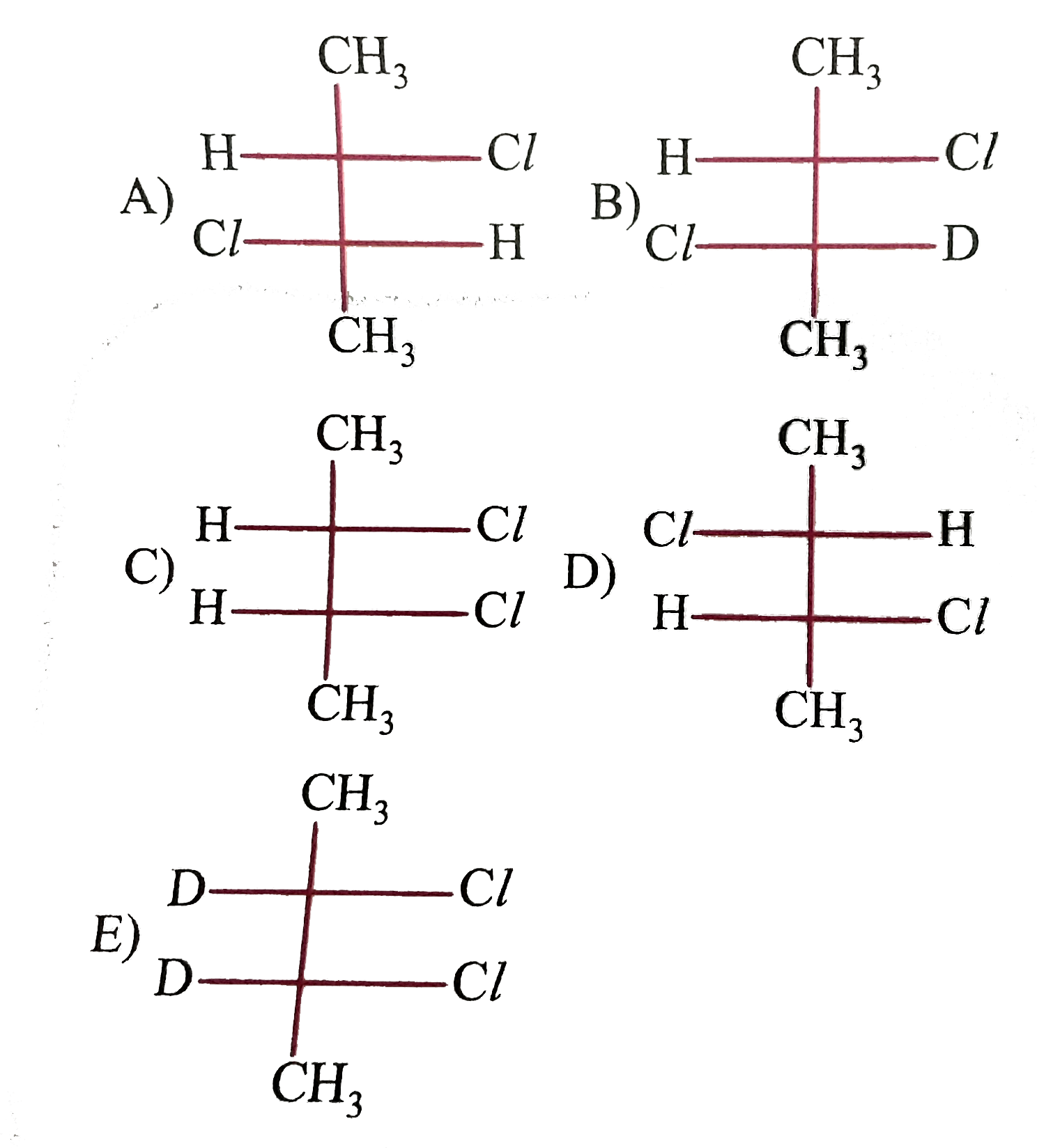An organic compound having a carbon attached to four different group is optically actve, But is it that opposite is also true? That is, do all optically active organic compounds have chiral carbons? Not necessarily. Presence or absence of chiral centre is not the sufficiet criterion for optical activity. The ultimate criterion is presence or abosence of either plane or centre of symmtry. Two compounds which are non super im[osabble mirror images of each other are called enantiomers. If a compound contains more than one chiral carbon, new words are required to describe the relationship between various stereo isomers of the compounds. Those words are diastereomers and mesomers.
Optically active compounds among the following is
CH3−CH2−CHCl−CH2−CH3
CH3−CH2−CDCl−CH2−CH3
CH3−CH2−CHD−CH2−CH3
CH3−CH2−CHD−CH3
The correct Answer is:4
Step by step video, text & image solution for An organic compound having a carbon attached to four different group is optically actve, But is it that opposite is also true? That is, do all optically active organic compounds have chiral carbons? Not necessarily. Presence or absence of chiral centre is not the sufficiet criterion for optical activity. The ultimate criterion is presence or abosence of either plane or centre of symmtry. Two compounds which are non super im[osabble mirror images of each other are called enantiomers. If a compound contains more than one chiral carbon, new words are required to describe the relationship between various stereo isomers of the compounds. Those words are diastereomers and mesomers. Optically active compounds among the following is by Chemistry experts to help you in doubts & scoring excellent marks in Class 11 exams.
Topper's Solved these Questions
- BOOK - NARAYNACHAPTER - GENERAL ORGANIC CHEMISTRYEXERCISE - COMP 32videos
GENERAL ORGANIC CHEMISTRY
- BOOK - NARAYNACHAPTER - GENERAL ORGANIC CHEMISTRYEXERCISE - COMP 41videos
GENERAL ORGANIC CHEMISTRY
- BOOK - NARAYNACHAPTER - GENERAL ORGANIC CHEMISTRYEXERCISE - COMP 11videos
GENERAL ORGANIC CHEMISTRY
- BOOK - NARAYNACHAPTER - GENERAL ORGANIC CHEMISTRY EXERCISE - LEVEL-II (H.W)21videos
GENERAL ORGANIC CHEMISTRY
- BOOK - NARAYNACHAPTER - HYDROCARBONS EXERCISE - EXERCISE - 418videos
HYDROCARBONS
Similar Questions
Isomerism - Optically Active Compounds
View SolutionAn organic compound having a carbon attached to four different group is optically actve, But is it that opposite is also true? That is, do all optically active organic compounds have chiral carbons? Not necessarily. Presence or absence of chiral centre is not the sufficiet criterion for optical activity. The ultimate criterion is presence or abosence of either plane or centre of symmtry. Two compounds which are non super im[osabble mirror images of each other are called enantiomers. If a compound contains more than one chiral carbon, new words are required to describe the relationship between various stereo isomers of the compounds. Those words are diastereomers and mesomers.
A sample of organic compound (S) is found to have optical rotation of +20∘. Which of the following statement(s) is/are correct of the sample.View Solution
Knowledge Check
- Question 1 - Select One
An organic compound having a carbon attached to four different group is optically actve, But is it that opposite is also true? That is, do all optically active organic compounds have chiral carbons? Not necessarily. Presence or absence of chiral centre is not the sufficiet criterion for optical activity. The ultimate criterion is presence or abosence of either plane or centre of symmtry. Two compounds which are non super im[osabble mirror images of each other are called enantiomers. If a compound contains more than one chiral carbon, new words are required to describe the relationship between various stereo isomers of the compounds. Those words are diastereomers and mesomers.

In the above compound no. of stereogenic centers and no. of optical active isomers possible are.A3,8B3,6C3,2D2,4 - Question 2 - Select One
An organic compound having a carbon attached to four different group is optically actve, But is it that opposite is also true? That is, do all optically active organic compounds have chiral carbons? Not necessarily. Presence or absence of chiral centre is not the sufficiet criterion for optical activity. The ultimate criterion is presence or abosence of either plane or centre of symmtry. Two compounds which are non super im[osabble mirror images of each other are called enantiomers. If a compound contains more than one chiral carbon, new words are required to describe the relationship between various stereo isomers of the compounds. Those words are diastereomers and mesomers.

Which of the following statements is/are correct regarding the above compound.AIt is optically inactive due to plane of symmetryBIt is optically inactive due to centre of smmetryCBeing chiral it ois optically activeDIt is optically active - Question 3 - Select One
An organic compound having a carbon attached to four different group is optically actve, But is it that opposite is also true? That is, do all optically active organic compounds have chiral carbons? Not necessarily. Presence or absence of chiral centre is not the sufficiet criterion for optical activity. The ultimate criterion is presence or abosence of either plane or centre of symmtry. Two compounds which are non super im[osabble mirror images of each other are called enantiomers. If a compound contains more than one chiral carbon, new words are required to describe the relationship between various stereo isomers of the compounds. Those words are diastereomers and mesomers.
Which of the following form diastereomeric pair?
 AA,BBB,CCA,CDD,E
AA,BBB,CCA,CDD,E
An organic compound having a carbon attached to four different group is optically actve, But is it that opposite is also true? That is, do all optically active organic compounds have chiral carbons? Not necessarily. Presence or absence of chiral centre is not the sufficiet criterion for optical activity. The ultimate criterion is presence or abosence of either plane or centre of symmtry. Two compounds which are non super im[osabble mirror images of each other are called enantiomers. If a compound contains more than one chiral carbon, new words are required to describe the relationship between various stereo isomers of the compounds. Those words are diastereomers and mesomers.
The optical rotation of a solution o fpure natural camphor is found to be +5.76∘ under the following conditions, concentration=0.13g/ml, lenghth of polarmeter=1dm, wavelength=sodium D line, T=25∘C The specific rotation of camphor isView SolutionSelect the optically active compound among the following :
View SolutionSelect the optically active compound among the following:
View SolutionIdentify the optically active compounds from the following
View SolutionIdentify the optically active compounds from the following :
View Solution

